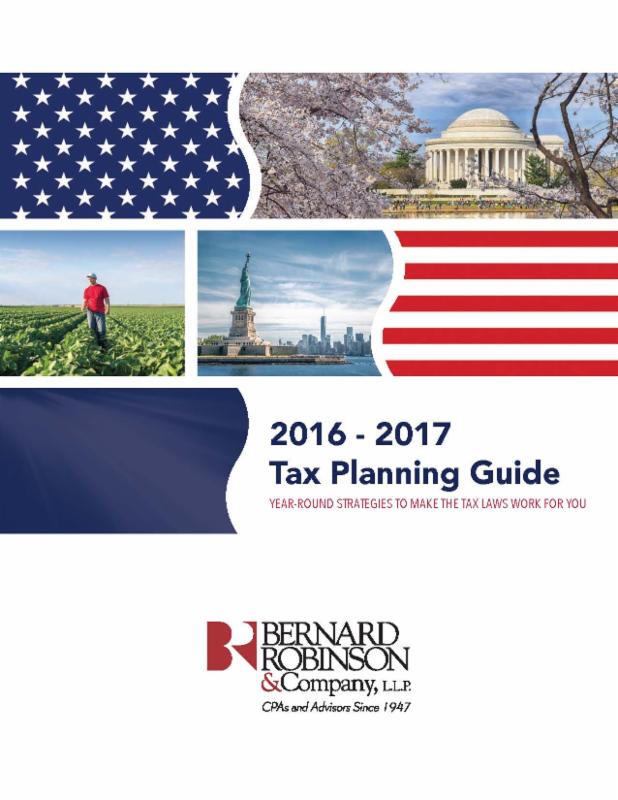2017 standard mileage rates for business, medical and charitable purposes announced. With the decrease in gasoline prices this year, all have been reduced from the 2016 rates. You can find more information about the rates here.
Qualified Small Employers May Offer Health Reimbursement Arrangements to Employees in 2017 without ACA-related penalties. You can find more information about this bill here.
|
Access Bernard Robinson & Company's 2016-2017 Tax Planning Guide here! 
|
|
Happy Holidays from BRC!
We are excited to help make Christmas dreams come true for local children in our community.



|
NC Sales & Use Tax Information for Changes Effective January 1, 2017.
|
|
 |
|
|
Are You Complying with Filing Requirements for Employee Benefit Plans?
|
By Rhonda Skiles, CPA, Partner
This article was originally published in March 2015. Our firm receives numerous questions regarding this topic and we thought it would be a helpful reminder.
Many employers of all sizes offer their employees various benefits including retirement and welfare benefit plans. The Department of Labor requires a Form 5500, Annual Return/Report of Employee Benefit Plan, be filed for most retirement and welfare benefit plans meeting certain criteria. Sometimes those responsible for administering these plans are not aware of the annual filing requirements.
Profit-sharing plans, 401(k) plans, and money purchase plans are some examples of retirement plans requiring an annual filing. Additionally, sponsors of 403(b) plans, common with non-profit organizations, must file Form 5500. If the retirement plan has fewer than 100 eligible participants, then a shorter version of the form, Form 5500-SF, can be filed. If the plan has 100 or more eligible participants, then an audited financial statement of the plan must be attached as part of the Form 5500 filing. Auditing employee benefit plans requires specialized knowledge and training. To ensure that your CPA has that knowledge and training, look for membership in the AICPA's Employee Benefit Plan Audit Quality Center.
Benefits provided by welfare benefit plans may include health, dental, life, and disability insurance benefits. Welfare benefit plans can be fully insured or self-insured. If the plan is self-insured, meaning benefits are paid out of the general assets of the plan sponsor/employer, then the plan is considered to be unfunded. Welfare benefit plans that have fewer than 100 eligible participants that are fully insured or unfunded are not required to file Form 5500. If the employer maintains a separate trust where employee or employer contributions are held to provide the benefits, then the plan is required to file Form 5500. Additionally, welfare benefit plans with 100 or more eligible participants are required to file Form 5500.
Remember, the responsibility is on the employer. If your company provides benefits to its employees and you are unsure of your responsibility regarding the filing of Form 5500, you should seek the advice of a tax professional with experience in employee benefit plan reporting requirements.
|
 |
New Year, New Accounting Standards
|
 By Ben Ripple, CPA, Senior Manager
As 2016 comes to a close, it's time to start looking forward to 2017. With all the celebrating of a new year and all the resolutions that will be broken by the second week of January, it is important to remember that some changes the New Year brings will last longer than a few weeks. Our friends at the Financial Accounting Standards Board (FASB) will be delivering several gifts with staying power. Here are some of the accounting standards updates that will be effective for year-ends beginning on December 15, 2016 and thereafter:
ASU 2014-02: Accounting for Goodwill
This standard allows nonpublic companies to amortize goodwill instead of testing it annually for impairment.
ASU 2014-15: Disclosures of Uncertainties about an Entity's Ability to Continue as a Going Concern
This standard requires management to assess whether or not there is a going concern issue and requires that the timeframe used for evaluation be at least a year from the date that the financial statements are available to be issued.
ASU 2015-01: Simplifying Income Statement Presentation by Eliminating the Concept of Extraordinary Items
This standard eliminates extraordinary items from the income statement. Any items that are infrequent in occurrence and unusual in nature will now be included in operating income on the face of the financial statements. Disclosure about unusual items would still be expected.
ASU 2015-03: Simplifying the Presentation of Debt Issuance Costs
This standard requires that debt issuance costs be netted against the related debt as a contra liability on the financial statements.
These are some of the more common standards that will have an effect on companies as we move into 2017. For a full list of recently issued accounting standard updates, please go to FASB's website to make sure you have properly implemented all of the new standards. If you have any questions about these standards or any of the other updates that are in the works, please reach out to your accounting service provider sooner rather than later to avoid surprises. |
 |
|
NCACPA Annual Meeting with the NC DoR
|

By Freddy Robinson, CPA, Partner
The North Carolina Association of CPA's (NCACPA) Taxation Committee met with the North Carolina Department of Revenue (NC DoR) in Raleigh on December 5, 2016. This is an annual meeting between the two groups, during which the NC DoR responds to questions submitted in advance by the NCACPA. The meeting also provides an opportunity for two organizations to establish personal relationships.
Secretary of Revenue Jeff Epstein expressed his appreciation for the cooperation from the NCACPA. Based on the recent election, he expects to be replaced by the incoming administration.
Most of the Department managers for the NC DoR were present and provided brief updates for their respective departments. Highlights from the updates are: - NC DoR will accept partnership returns electronically filed beginning with 2016 returns.
- NC LLC annual reports can be e-filed with the Secretary of State, but must be paper filed if submitted to the NC DoR. Any payments should be submitted to the Secretary of State.
- NC instituted sweeping sales tax changes effective July 1, 2016. This has created a large strain on compliance resources for the NC DoR.
- Similar to the IRS, the NC DoR has many issues with identity theft.
- The NC DoR information reform (forms 1099) matching process utilizing data supplied by the IRS has been completed through 2012. The NC DoR is working hard to catch up in this process in order to avoid statute of limitation issues.
|
 |
|
Virtual Private Networks, and Why You Should Be Using Them
|

By Casey Cox, CPA, IT Support Specialist
In the current age of technology, mobility, and security, VPNs are becoming a necessity. Imagine you are working in a coffee shop or working from your hotel room and using the free Wi-Fi. All the information being sent to and from your laptop or phone is being broadcast to the entire room. While many websites use encryption to keep your information secure, there is a chance that bad guys can capture your sensitive data (passwords and credit card numbers, for example), especially if they trick you into connecting to their own fake Wi-Fi network that is set up to look like a legitimate hotspot. Have you ever connected to "ATT Wi-Fi" or "StarBucks HotSpot"? How do you know it's not a thief trying to steal your information?
VPN is an acronym for Virtual Private Network. It simply takes all of your internet requests (i.e. going to amazon.com and clicking on products), encrypts them, and sends them to your VPN service's server. That server then makes all of those requests to amazon.com on your behalf and sends the results back to your computer with the same level of encryption. To the user, it's as if they are connecting to the internet directly, but behind the scenes the encryption is keeping the user's data safe. It's like a secret tunnel that only you and your VPN provider know about. Anyone trying to gather information from your computer on a public Wi-Fi network is going to get useless encrypted data. This even protects you if you connect to a fake Wi-Fi signal.
There are several business grade VPN service providers out there. Prices range from less than $4 and up to more than $8 per user, per month. Each provider has its own offering of software, user management tools, support, and mobile apps, so it is important to compare providers regarding what services you will need.
|
|
|
Bernard Robinson & Company, L.L.P. | (336) 294-4494 | sturner@brccpa.com |
1501 Highwoods Blvd, Ste 300
Greensboro, NC 27410 |
|
BRC Strategy is designed to provide information of a general nature and is not intended as a substitute for professional consultation and advice. The opinions and interpretations expressed should not be construed or used as legal or tax advice, written or otherwise, and cannot be used for the purpose of avoiding any penalties that may be imposed under federal, state or local law.
|
|
|
|
|
Copyright © 2015. All Rights Reserved.
|
|
|
|